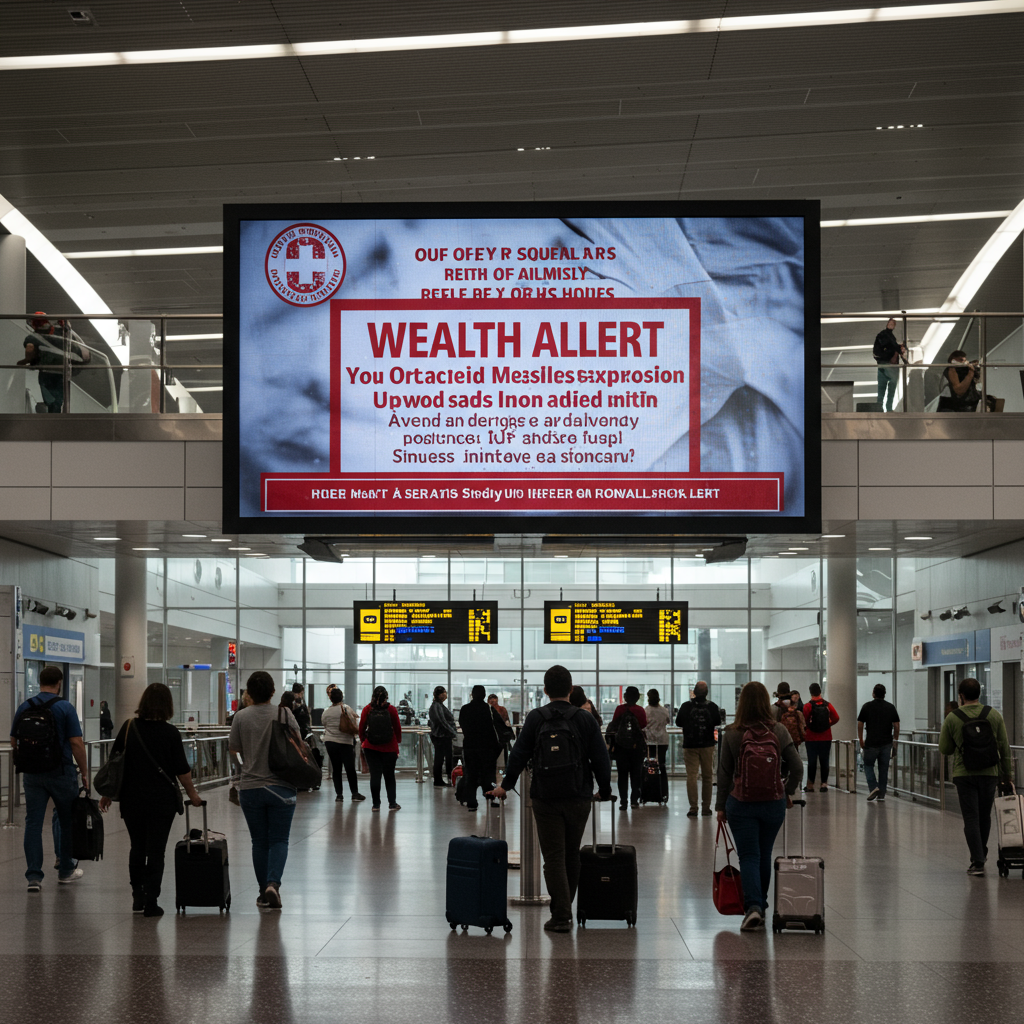Arizona health officials have issued an alert after confirming a traveler infectious with measles passed through Phoenix Sky Harbor International Airport, the state’s largest airport.
The Maricopa County Department of Public Health (MCDPH) confirmed the exposure event occurred on Tuesday, June 10, 2025. Authorities are now working to identify and notify individuals who may have been exposed to the highly contagious virus.
Phoenix Sky Harbor Exposure Details
The potential exposure took place within Terminal 4, specifically beyond security checkpoints in Concourses C and D. The identified exposure window was between 5:00 PM and midnight on Tuesday, June 10, 2025.
Measles is an airborne virus that can remain infectious in a space for up to two hours after an infected person has left. The stated exposure timeframe includes this crucial airborne period.
MCDPH is coordinating closely with federal, state, and airport officials to address the situation. “MCDPH is coordinating with other agencies to notify people who may have been exposed so they can watch for symptoms and get care if any develop,” said Dr. Nick Staab, Chief Medical Officer for MCDPH. Individuals who were on the same flight as the confirmed case will routinely be notified directly by their local public health department.
Understanding the Risk: Why Measles is Serious
Measles is one of the world’s most contagious viruses, spreading easily through the air when an infected person breathes, coughs, or sneezes, or through direct contact. An individual can spread measles to others even before they begin to feel sick or show the characteristic rash.
While often thought of as a childhood illness, measles can cause severe illness and complications in anyone, and in some cases, it can be deadly. It poses a particularly high risk for young children, pregnant women, and individuals with weakened immune systems. Serious complications can include pneumonia (affecting about 1 in 20 children), encephalitis (brain swelling, about 1 in 1,000, potentially causing convulsions, deafness, or intellectual disability), deafness, and blindness.
An estimated 90% of unvaccinated individuals exposed to measles will become infected.
Part of a National Trend: Rising Measles Cases
This Phoenix exposure occurs amid a concerning rise in measles cases both locally and nationally. Arizona reported its first 2025 measles cases in Navajo County earlier in June, linked to international travel by unvaccinated individuals.
Across the United States, measles cases have surged significantly this year. As of mid-June 2025, the Centers for Disease Control and Prevention (CDC) reported 1,197 confirmed cases across 35 states – more than four times the total reported in all of 2024. Three deaths have been attributed to measles in the U.S. this year. This resurgence is raising concerns about the U.S. potentially losing its measles ‘elimination’ status, a milestone achieved in 2000.
Public health officials attribute this increase partly to declining vaccination rates nationwide – fueled by factors like vaccine skepticism and insufficient education – coupled with increased international travel and heightened global measles activity. This combination is leading to more travel-linked importations of the virus, similar to recent exposures tracked at other major airports and public places across the country. Arizona’s own kindergarten vaccination rate for MMR falls below the 95% threshold considered necessary for strong community immunity.
Prevention is Key: Vaccination
Measles is highly preventable with vaccination. Two doses of the Measles, Mumps, and Rubella (MMR) vaccine are approximately 97% effective in preventing infection. The typical vaccination schedule includes a first dose between 12 and 15 months of age and a second dose between 4 and 6 years old. Adults need at least one dose of the MMR vaccine given after age one. Individuals born before 1957 or who have had a confirmed measles infection are generally considered immune. Vaccination is not just personal protection; it acts as a vital social contract to protect vulnerable populations who cannot be vaccinated or may not develop full immunity.
What To Do If You Were at Sky Harbor During the Exposure Time
If you were in Phoenix Sky Harbor Terminal 4, beyond security in Concourses C or D, between 5:00 PM and midnight on Tuesday, June 10, 2025, here’s what you should do:
Check Your Immunity: Find out if you have been vaccinated for measles or have had measles previously. Ensure you are up-to-date with the recommended number of MMR vaccinations.
Check Records: Arizona residents can often check immunization records through myIR via the Arizona Department of Health Services. For assistance, you can call the CARES Team at (602) 506-6767.
Understand Your Risk: Individuals who have not previously had measles infection or received the measles vaccine are at risk if exposed. Vaccinated individuals are at very low risk.
Monitor for Symptoms: Watch yourself for symptoms of measles for up to 21 days following the exposure date (until July 1, 2025).
Watch for Measles Symptoms
Symptoms typically appear 7 to 21 days after exposure. Look for:
Fever (101° F or higher, potentially spiking over 104°F as the rash appears)
Red, watery eyes
Cough
Runny nose
A characteristic red, raised, and blotchy rash. The rash usually begins after other symptoms, starting on the face at the hairline and moving down the body. It may last for five to six days.
If Symptoms Appear: Seek Care Immediately
If you develop any symptoms consistent with measles, you must take immediate action to prevent further spread:
Self-Isolate: Stay away from others immediately.
Seek Medical Attention: Call your healthcare provider or a medical facility (such as a local hospital emergency room or urgent care center) for guidance.
CALL FIRST: It is critical that you call ahead before visiting in person. This allows the medical facility to make arrangements to see you safely without potentially exposing other patients and staff to the highly contagious virus.
MCDPH is encouraging healthcare providers to be alert for unvaccinated patients presenting with fever and rash, especially if they have a known exposure history, and reminds providers they are required to report suspect cases of measles to their local health department.
“Measles is both highly contagious and preventable,” Dr. Staab reiterated. “It can cause severe illness, including death, so we strongly encourage anyone who has not been vaccinated to get vaccinated to prevent further spread.”
For more detailed information on measles, visit the Maricopa County Department of Public Health website.




